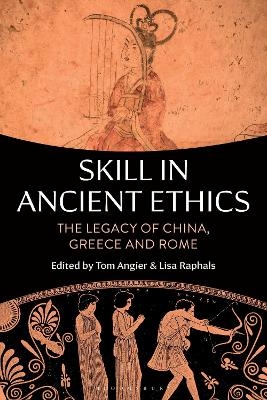
Skill in Ancient Ethics
Bloomsbury Academic (Verlag)
978-1-350-10432-7 (ISBN)
Divided into six sections – on Plato, Aristotle, the Stoics, Mencius and Xunzi, the Mohists and Zhuangzi, and comparative perspectives – world-leading philosophers explore the significance of skill according to traditional figures, as well as lesser-known philosophers such as Carneades and Antipater, and texts such as the Zhuangzi. In doing so, the seventeen contributors illustrate how skill, expertise and ‘know how’ are essential to and foundational within ancient ethical thought.
As the first collection to foreground skill as central to ancient Greek, Roman and Chinese ethics, this is an essential resource for anyone interested in the value of cross-cultural philosophy today.
Tom Angier is Senior Lecturer in the Department of Philosophy at the University of Cape Town, South Africa. Lisa Raphals is Professor in the Department of Comparative Literature and Languages at the University of California Riverside, USA.
Introduction, Tom Angiers (University of Cape Town, South Africa) and Lisa Raphals (University of California, Riverside, USA)
Part I: Skill in Plato’s Ethics
1. Socrates: Apprentice at Politics, Nicholas D. Smith (Lewis and Clark College, USA)
2. The Question is not ‘Can Virtue be Taught? but ‘Can Virtue be Learned?’, Naomi Reshotko (University of Denver, USA)
3. The Contest Between Philosophy and Rhetoric in Plato’s Gorgias, Laurence Bloom (Rhodes University, USA)
4. A Dewian Conception of Skill as Clue to the Analogy between Craft and Virtue in the Platonic Dialogues, Robin Weiss (American University in Cairo, Egypt)
Part II: Skill in Aristotle’s Ethics
5. Steering against the Bad: An Aristotelian Account of Virtue as Two-Way, Jennifer Rothschild (University of Florida, USA)
6. Virtue Cultivation and the Skill of Emotion Regulation, Paul Carron (Baylor University, USA)
7. Aristotle on Techne: Two Theses in Search of a Synthesis?, Joseph Dunne (St Patrick’s College Dublin, Ireland)
Part III: Skill in Stoic Ethic
8. The Craftsman of Impulse: Chrysippus on Expertise and Moral Development, Tue Søvsø (University of Copenhagen, Denmark)
9. Being and Becoming Good: Seneca’s Two Moral Conceptions of Ars, Stefan Röttig (University of Würzburg, Germany)
Part IV: Skill in Confucian Ethics
10. Cultivating Goodness or Manifesting Goodness: Two Interpretations of the Mencius, Winnie Sung (Nanyang Technological University, Singapore)
11. Ritual as a Skill: Ethical Cultivation and the Skill Model in the Xunzi, Siufu Tang (University of Hong Kong, Hong Kong)
Part V: Skill and Ethics in the Zhuangzi
12. A Path with No End: Skill and Dao in Mozi and Zhuangzi, Chris Fraser (University of Hong Kong, Hong Kong)
13. Skilfulness and Uselessness in the Zhuangzi, Wai Wai Chiu (Lingnan University, China)
14. Dao and Agency: What do the Zhuangzi’s Skill Stories Tell Us about Life?, Karyn Lai (University of New South Wales, Australia)
Part VI: Comparative Perspectives on Skill in Ethics
15. Can One Become Wise by Learning to Catch Cicadas? Analogies between Crafts and Wisdom in Daoism and Stoicism, David Machek (University of Bern, Switzerland)
16. Gendered Skill: Chinese and Greek Skill-Knowledge Analogies from Archery and Weaving, Lisa Raphals (University of California, Riverside, USA)
17. The Skillful Wanderer on the Risks and Rewards of travel in Plato and Zhuangzi, Rohan Sikri (University of Georgia, USA)
Index
| Erscheinungsdatum | 22.10.2021 |
|---|---|
| Verlagsort | London |
| Sprache | englisch |
| Maße | 156 x 234 mm |
| Gewicht | 721 g |
| Themenwelt | Geisteswissenschaften ► Philosophie ► Erkenntnistheorie / Wissenschaftstheorie |
| Geisteswissenschaften ► Philosophie ► Östliche Philosophie | |
| Geisteswissenschaften ► Philosophie ► Philosophie Altertum / Antike | |
| ISBN-10 | 1-350-10432-9 / 1350104329 |
| ISBN-13 | 978-1-350-10432-7 / 9781350104327 |
| Zustand | Neuware |
| Haben Sie eine Frage zum Produkt? |
aus dem Bereich

![Was heißt Denken?. Vorlesung Wintersemester 1951/52. [Was bedeutet das alles?] - Martin Heidegger](/media/113619842)
